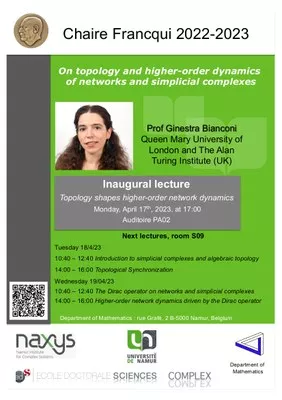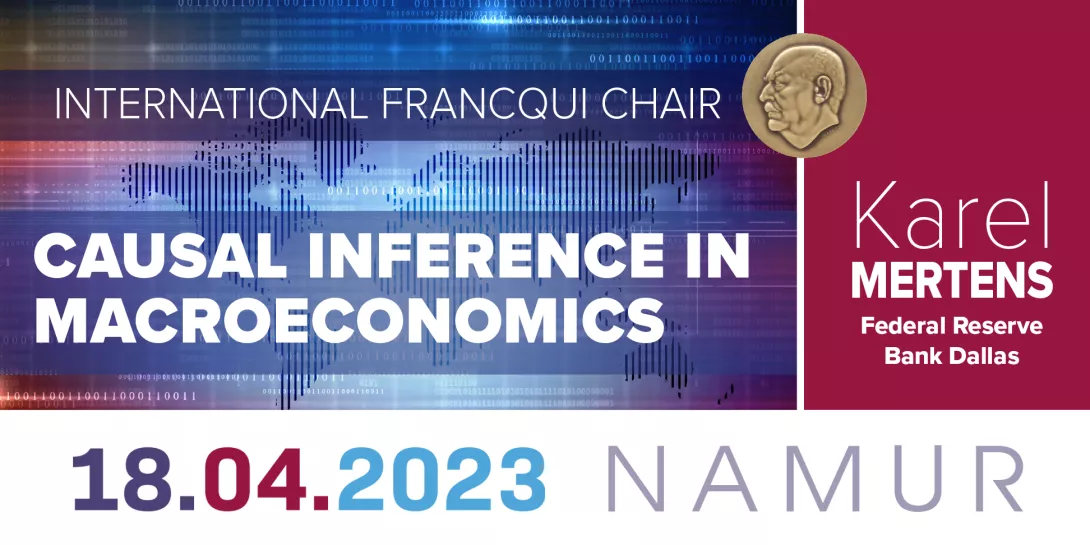The Francqui Foundation and the International Chairs
In 1932, Emile Francqui and Herbert Hoover decided to set up a fund with substantial capital to promote "the development of higher education and scientific research in Belgium". This includes the encouragement of inter-university and international collaboration.

These International Chairs are awarded annually and must be applied for by at least two universities. The Chairholder stays between 3 and 6 months at one of the institutions but shares his/her activities between all institutional partners. This strengthens the collaboration with foreign countries and broadens the horizons of our young academic collaborators.
An International Francqui Chair includes:
- an inaugural lecture with the award of the Francqui medal to the holder.
- active participation in the scientific life of the groups concerned.
- "Classes of excellence" which contributes to the training of young people through contacts and lectures at the universities involved.
- a closing symposium
From 17 April 2023 | International Francqui Chair in mathematics
Professor Timoteo Carletti (UNamur, Department of mathematics, naXys institute) is hosting Professor Ginestra Bianconi (Queen Mary University London and The Alan Turing Institute (UK), who is one of the leading experts on networks and high-order structures. She obtained her master's degree at the University of Rome La Sapienza (Italy) and her PhD at the University of Notre Dame (USA) under the supervision of Professor Barabasi, one of the fathers of network science. After a few years spent in Freiburg (Germany) and at the International Centre for Theoretical Physics in Trieste (Italy), she joined the faculty of Northeastern University (USA) as an assistant professor. Finally, in 2013, she became a lecturer at Queen Mary University of London, where she is now a full professor.

The activities organised in the framework of this Chair are aimed at master students, PhD students and researchers interested in dynamical systems, synchronisation, network science, high order models and their interactions.
In the planned series of lectures, Prof. Bianconi will introduce participants to the basic concepts and mathematical tools of high-order networks. The opening lecture will be more general, aimed at a wider audience, and will be followed by a cocktail reception. The other four lectures will be more technical, but still open to all researchers and students with a basic knowledge of mathematics.
Complex systems
A flourishing of regular spatio-temporal patterns can be observed in nature. They are the signature of self-organising processes where ordered structures emerge from disordered structures. Think of biological systems, where internal microscopic constituents interact selectively, through a sequence of self-consistently regulated steps, which result in a coherent and robust overall behaviour. Like a school of fish, where each animal interacts visually with its neighbours and reacts accordingly to avoid collisions and achieve a prescribed goal, e.g. to defend itself against predators. Or a group of fireflies where each insect, by adapting to the rhythm of its neighbours, allows the group to flicker as an individual, amplifying the light signal emitted.
Can we model the emergence of these patterns? This is one of the key questions in the research on complex systems carried out at the naXys Institute. In particular, our researchers have applied the tool of network science, where pairwise interactions between chemicals, fish or fireflies are described by the edges of the network. However, it has recently been widely recognised that networks only provide a first-order approximation of reality, whereas interactions between groups formed by three, four or many more individuals should be taken into account to accurately describe the behaviour of the system. To capture these many-body relationships, researchers have developed models of higher-order networks, such as simplicial complexes. The latter have very specific geometric features that show that the topology has a fundamental impact on the temporal evolution of the system.
The immense possibilities offered by the new framework of high-order networks are only just beginning to be unveiled and this cutting-edge research is becoming increasingly relevant in complex systems.
From 18 April 2023 | International Francqui Chair in Economics
Professor Romain Houssa (UNamur, Faculty of economics, social sciences and management - DeFiPP Institute), in collaboration with three partner institutions (KULeuven, UAntwerp and Ghent University) has been awarded the prestigious Francqui International Professor Award 2021-2022.

Professor Karel Mertens will stay at the Faculty of Economic, Social and Management Sciences (FSESG) from 1 April 2023 to 30 June 2023. He will join our institution to work on the following topics: "Causal Inference in Macroeconomics" and "Redistributive Effects of Fiscal Policy and Taxation".
Karel Mertens is Senior Policy Advisor at the Federal Reserve Bank of Dallas (FRBD), where he plays a leading role in the research department. He has worked on the subject of causal inference in macroeconomics, i.e. the art of distinguishing cause from effect in macroeconomics. His research has led to an understanding of the macroeconomic and redistributive effects of fiscal policy, particularly taxation, on the effects of credit policy and monetary policy. He has also produced an indicator that makes it possible to measure economic activity in the US on a weekly basis.
Karel Mertens is a renowned researcher who has done outstanding work in his field. He has published in several leading economic journals, such as the Quarterly Journal of Economics, the American Economic Review, the Review of Economic Studies, the Journal of Monetary Economics and the Economic Journal. He is a research fellow at the Centre for Economic Policy Research and an associate editor of the Journal of European Economic Association.
Causal inference in macroeconomics
The distinction between cause and effect is at the heart of academic research in macroeconomics and many important policy debates, as evidenced by the Nobel Prizes in Economics (2011). Recent developments in macro-econometrics and measurement have led to a better understanding of the impacts of policy changes and unexpected events on the macroeconomy. Karel Mertens will introduce the topic of causal inference in macroeconomics to a broad audience of students and researchers working in academic and policy organisations who are not necessarily active in this field. He will provide applications based on the redistributive impacts of monetary and fiscal policies.